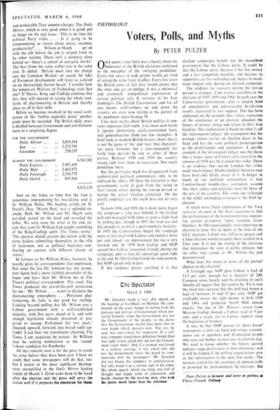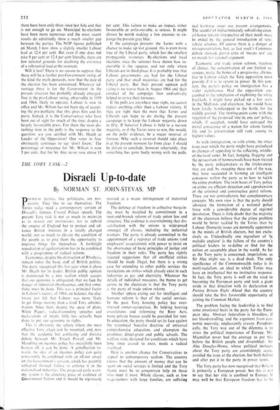PSEPHOLOGY
Voters, Polls, and Myths
By PETER PULZER
ONCE upon a time there was a theory about the behaviour of the British electorate enshrined in the metaphor of the 'swinging pendulum.' Every few years. it said, people would get tired of seeing the same faces in office. Every few years the British sense of fair play would ensure that the other side got an innings. It was a whimsical and eventually non-political explanation of serious political acts. It survives in Sir Ivor Jennings's The British Constitution. and for all one knows sixth-formers up and down the country are even now staring at his picture of th: pendulum opposite page 30.
Like most myths about British politics it con- tains important half-truths. Like most such myths it ignores elementary, easily-ascertained facts, and generalisations from too few examples. A brief look at modern British history shows that it is not the game of 'ins' and 'outs' that character- ises party fortunes, but a semi-monopoly for fairly long periods by one or other of these parties. Between 1950 and 1959 the country swung right four times in succession. Not much pendulum there.
But this particular myth has disappeared from sophisticated political commentary only to be replaced by others. Of these the favourite is that governments stand to gain from the swing in their favour either during the run-up period or during the actual election campaign. On the purely empirical test this myth does not do very well.
In both 1950 and 1951 the Labour party began the campaign a :ong way behind in the Gallup poll and managed both times to gain a slight lead by polling day, though in 1951 this lead was not big enough to secure it a parliamentary majority. In 1955 the Conservatives began the camPaign more or less level with Labour and ended it three per cent ahead—an improvement but not a very marked one. In 1959 both Gallup and NOP agreed that Labour recovered strongly during the campaign, only to lose this advantage again right at the end. In 1964 Gallup found the same pattern, but NOP agreed only in part.
If this evidence proves anything it is that
election campaigns benefit not the incumbent government but the Labour party. It could be
that the Labour party, because it has less money
and a less competent machine, and because its supporters are less well-educated, makes its maxi-
mum impact only during an election campaign.
The evidence for recovery during the run-up period is stronger, if we restrict ourselves to the elections of 1955, 1959 and 1964. In each case the Conservative government, after a longish bout of unpopularity and unfavourable by-election results, recovered its lost support. This has been
explained on the grounds that voters, conscious of the imminence of an election, abandon the luxury of protest voting and return to their firm loyalties. This explanation is based on what I call the 'information fallacy': the assumption that the average citizen carries an election diary in his head and has the same political preoccupation as the professionals and journalists. A specific example of the information fallacy was the thesis that a major cause of Conservative revival in the summer of 1958 was the London bus strike. There is no evidence that outside London this strike made much impact. Huddersfield or Swansea may have been only dimly aware of it. A danger in much of our political commentary is that London-based middle-class journalists assume that their values and priorities must be those of the rest of the country. This came out strikingly in the wildly misleading coverage the Hull by- election..
A much more likely explanation of the Tory recovery on each of the three occasions is that the performance of the Government was improv- ing -- greater prosperity, lower taxation, fewer blunders. In 1964 most pundits were expecting an election in June. Yet in April, at the time of the GLC elections, Labour was still at its apogee and a June election would certainly have resulted in a Tory rout. It is not the timing of the elections that determines the state of public opinion, but the other way round, as Mr. Wilson has just demonstrated.
What does this mean in terms of the parties' chances in this election?
A fortnight ago NOP gave Labour a lead of 13.5 per cent, enough for a majority of 200. Common sense, hunch, and the pricking of one's thumbs all suggest that this cannot be. Yet it was the third time running that this poll had shown a lead of between 13 and 15 per cent. NOP got creditably nearer the right answer in both 1959 and 1964 and predicted North Hull almost exactly. The day of Mr. Wilson's return from Moscow Gallup showed a Labour lead of 9 per cent, and a steady rise in Labour support since the beginning of January.
It may be that NOP presses its 'don't know' respondents a little too hard and wrings commit- ments out of apathetic and ill-educated people who may not bother to turn out on election day. We need to know whether the figures quoted indicate vague preferences or firm intentions, and it will be helpful if the polling organisations give us this information in the next few weeks. The normal control for the accuracy of opinion polls is provided by parliamentary by-elections. But Peter Pulzer i.s lecturer and tutor in politics a ehrivt Church, Oxford.
there have been only three since last July and that is not enough to go on. Municipal by-elections have been more numerous and the most recent results do admittedly show a much smaller gap between the parties. The NOP figures published on March 3 now show a slightly smaller Labour lead at 12.4 per cent. But even if one does not take 9 per cent or 12.4 per cent literally, there are few rational grounds for doubting the existence of a substantial lead at the moment.
Will it last? There is no reason to suppose that there will be a further pro-Government swing, of the kind the myth demands, now that the date of the election has been announced. Whatever ad- vantage there is for the Government in the present situation has probably already emerged. Nor is the pro-Labour swing, observable in 1959 and 1964, likely to operate. Labour is now in office and Mr. Wilson has not been shy of accept- ing the pre-publicity that this gives him and his party. Indeed, it is the Conservatives who have been out of sight for much of the time, despite a largely favourable press. For them the most dis- turbing item in the polls is the response to the question: are you satisfied with Mr. Heath as Leader of the Opposition? One voter in four obstinately continues to say 'don't know.' The percentage of nescience for Mr. Wilson is now 5 per cent, that for Sir Alec never rose above 15 per cent. This failure to make an impact, either favourable or unfavourable. is serious. It might almost be worth making a few enemies to ex- punge the present grey blur.
If the campaign presents the Tories with a chance to make up lost ground, this is even more true of the Liberal party, which has the smallest propaganda resources. By-elections and local elections since the summer have shown how in- exorable is the squeeze, and not only where Liberals are in third place. It is probably true that Labour governments are bad for the Liberal party and that small majorities are bad for the Liberal party. But their present opinion poll rating is no worse than in August 1964 and their conduct of the campaign then undoubtedly helped to revive their fortunes.
If the polls are anywhere near right, we cannot expect anything other than a Labour victory. If they are right then the most that Tories and Liberals can hope to do during the present campaign is to keep the Labour majority down to fifty. If however Labour is held to a narrow majority, or if the Tories were to win, this would. on the polls' evidence, be a major reversal of fortune. Why such a reversal should take place is at the present moment far from clear. I should be driN en to conclude, however reluctantly, that something has gone badly wrong with the polls.



































 Previous page
Previous page